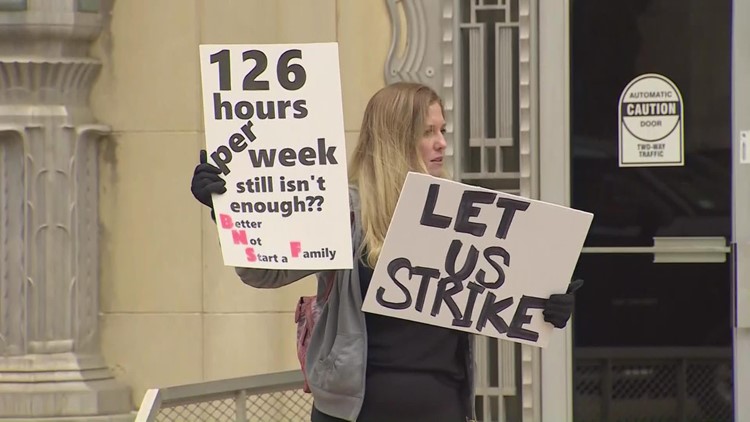The restraining order was granted despite two unions, composing of nearly 17,000 BNSF employees, threatened to strike over the new policy.
TEXAS, USA — On Tuesday, a federal judge in Fort Worth granted BNSF, one of the nation’s largest freight companies, a temporary restraining order, blocking nearly 17,000 employees from striking over the company’s new attendance policy.
The policy titled “Hi-Viz” goes into effect next week on Feb 1.
Two BNSF unions — Brotherhood of Locomotive Engineers and Trainmen, as well as the Transportation Division of the International Association of Sheet Metal, Air, Rail and Transportation — threatened to strike over the new policy, describing it as a point system that penalizes employees for taking time off, despite having no assigned days off in many cases.
Both sides presented their arguments to Judge Mark Pittman on Monday with BNSF saying the issue was a “minor dispute” over the interpretation of existing rights under the company’s collective bargaining agreements with the unions, according to court filings. In other words, the company said the matter has to be resolved by negotiating, not striking.
“Rail strikes — even if brief or localized — can cause devastating and irreparable harm to carriers, their customers, other railroads, and the general public. The threatened strike in this case would strain an already overburdened supply chain, potentially causing wide-ranging harm to the national economy,” BNSF said in its lawsuit.
The unions, on the other hand, said the issue is “major” and would violate their rights.
“This unprecedented BNSF policy repudiates direct and clear contract language, and in application, will attempt to force our members to report for duty without regard for their medical condition as we struggle to come out of a pandemic,” union presidents Dennis Pierce and Jeremy Ferguson said in a joint statement.
(See how the policy works below.)
Pittman released his ruling Tuesday afternoon, saying it wasn’t up to the courts to decide if “Hi-Viz” is a bad policy or not. Instead, he said they had to decide if the dispute was “major” or “minor” under the Railroad Labor Act (RLA).
In the end, Pittman granted BNSF a temporary restraining order and said striking would violate the RLA.
“[W]ithout a temporary restraining order barring an ‘illegal strike over a minor dispute,’ BNSF would suffer substantial, immediate, and irreparable harm. The Unions, however, will not suffer any harm as a result of a temporary restraining order that this Court, or an arbitrator, cannot remedy…,” court documents state.
The judge also discussed how striking would impact the economy and public interest, as well.
“The record further establishes that a strike would exacerbate our current supply-chain crisis—harming the public at large, not just BNSF,” documents state. “A temporary restraining order will thus serve, rather than disserve, the public interest. Accordingly, the Court concludes that granting a temporary restraining order is appropriate.”
The temporary restraining order is set to expire on Feb. 8, unless the court says otherwise, according to documents.
BNSF issued the following statement to 6 News:
“We are pleased that today’s ruling allows us to move forward working together with our employees to do what we do best in providing service that is essential to our customers and the American economy. BNSF’s new system will provide more predictability for our train crews while also providing more reliable crew availability, which is essential to meeting our customers’ expectations and the demands posed by an increasingly competitive global supply chain. Our program is designed to provide ample time for obligations outside of work, including planned vacations, personal leave days and unplanned absences while ensuring that we have sufficient employees available to work. We continue to take employee feedback on the program and that feedback is being reviewed. BNSF team members drive our success and we couldn’t deliver the nation’s goods without them. We understand that change can be an adjustment, but working together with our employees, we believe we can adapt to meet today’s competitive freight environment.”
BNSF is one of the nation’s largest freight companies. The company transports agricultural and industrial goods nationwide on almost 33,000 miles of track. A potential strike would affect 17,000 union workers.
Click here to read the judge’s order.
BNSF workers, families protest over company lawsuit


RELATED: Loved ones of railroaders protest new attendance policy outside federal courthouse during hearing
How does the new attendance policy work?
Both BNSF unions are describing the attendance policy like a point system. Railroaders are given a total of 30 points for the rest of their careers. They are docked a certain number of points each time they take days off outside of the allocated vacation days.
It is broken down as follows:
- Monday through Thursday: Lose two points
- Friday through Saturday: Lose four points
- Sunday: Lose three points
- Holidays: Lose seven points
According to the new policy, in order to earn points back, they have to work two weeks straight.
One employee told our sister station, WQAD, that employees are also expected to be available 90% of the time as opposed to the current 75%.
